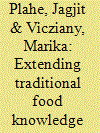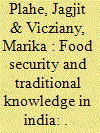|
|
|
Sort Order |
|
|
|
Items / Page
|
|
|
|
|
|
|
| Srl | Item |
| 1 |
ID:
154560


|
|
|
|
|
| Summary/Abstract |
Small farmers, who are normally dependent on marketing intermediaries, have formed themselves into co-operatives in the Indian states of Telangana, Andhra Pradesh and Maharashtra and have started to sell their produce directly to consumers via retail outlets, the Internet, urban franchises, mobile vans, rural food hubs and as branded products. The key engine for this marketing experiment is the Sahaja Aharam Producer Company Limited (SAPCO), a producer organisation. SAPCO has tried to create new supply chains that guarantee that the produce it sells complies with the quality standards needed to certify the foods as ‘organic’. SAPCO is an initiative of the Centre for Sustainable Agriculture (CSA) which has taken up the bulk of the financial and administrative burden of managing the company. The revival of traditional knowledge for organic farming and the marketing of organic produce has invariably required the intervention of external agents such as CSA. In the final section, we assess the achievements of SAPCO from the viewpoint of the small farmers who belong to the producer co-operatives that make up SAPCO's membership. Our key research question is whether it has been possible to scale up the production and marketing of small farmers’ output and create a new supply chain independent of local intermediaries.
|
|
|
|
|
|
|
|
|
|
|
|
|
|
|
|
| 2 |
ID:
154555


|
|
|
|
|
| Summary/Abstract |
In this first paper, we explain why traditional knowledge is an important theme in the study of Indian agriculture, especially given the crises routinely facing poor, smallholder farmers. We begin with an overview of some of the key authors who have written about the problems facing small farmers both within and outside India. Different authors have focused on different aspects of the benefits that can be derived from the local knowledge and skills of farmers, but these do not always pertain to organic farming. Our interest in organic farming is specifically about ‘traditional’ knowledge. With the industrialisation of agriculture in India and elsewhere, many poor, small farmers have been deskilled and placed into vulnerable positions. Traditional knowledge has been undermined, overwhelmed or has survived only in fragments. How ‘traditional knowledge’ might be retrieved, reinvented, reintroduced and modified so as to create a farmer-driven, sustainable and biodiverse agriculture is our concern. In the final section of this paper, we analyse the four situations we have been working on as examples of the possibilities and challenges facing the revival of ‘traditional knowledge’ in the villages of Kolkata, central India and Sikkim.
|
|
|
|
|
|
|
|
|
|
|
|
|
|
|
|
| 3 |
ID:
141636


|
|
|
|
|
| Summary/Abstract |
Genetically modified crops alone are not enough to assure that smallholder farmers will prosper, but they can help to improve their livelihoods.
|
|
|
|
|
|
|
|
|
|
|
|
|
|
|
|
| 4 |
ID:
184130


|
|
|
|
|
| Summary/Abstract |
There are ongoing discourses on contract farming across the world. Contract farming is an issue of serious concern in India today, among farmers as well as policymakers. Such farming among small and marginal farmers, who are facing several problems in agriculture, requires special attention. Considering the large presence of small and marginal farmers and PepsiCo’s Frito-Lay model of potato contract farming in the state of West Bengal, which is India’s second largest producer of potatoes, a study is imperative from the perspective of small and marginal farmers and their participation in potato contract farming. The present paper discusses the nature and extent of participation of small and marginal farmers in potato contract farming in the state. Although participation is qualitative and interpretative in nature, the study considers the attributes which are mainly quantitative or measurable. In order to understand the nature and extent of the participation of small and marginal farmers in contract farming, the study also focuses on the participation of other stakeholders such as vendors and non-marginal and small farmers, and a comparison of socioeconomic conditions between the contract and non-contract farmers is undertaken.
|
|
|
|
|
|
|
|
|
|
|
|
|
|
|
|
|
|
|
|
|